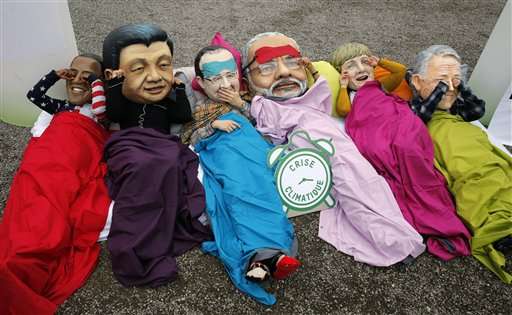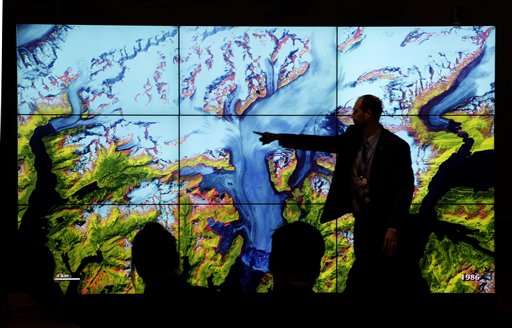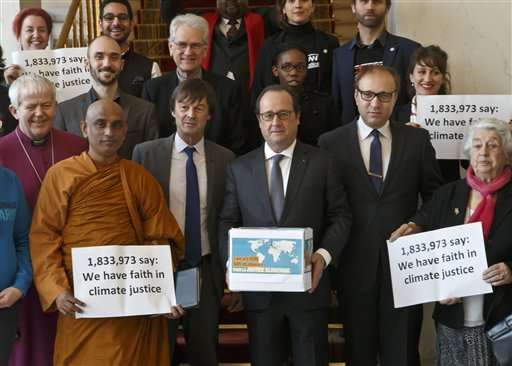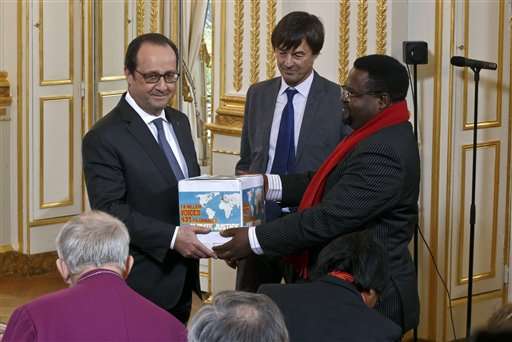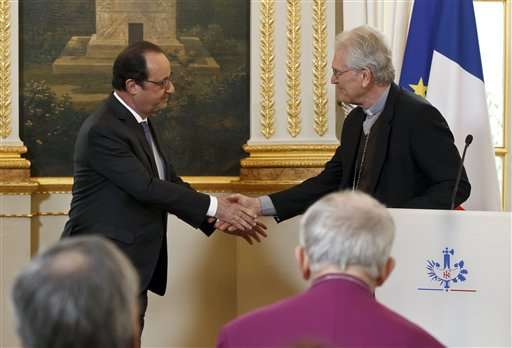Oxfam activists wear masks of from left, U.S. President Barack Obama, Chinese President Xi Jinping, French President Francois Hollande, India's Prime Minister Narendra Modi, German Chancellor Angela Merkel and Australia's Prime Minister Malcolm Turnbull as they stage a protest during the COP21, United Nations Climate Change Conference in Le Bourget, north of Paris, Thursday, Dec. 10, 2015. (AP Photo/Christophe Ena)
Negotiators from China, the U.S. and other nations haggled into the early morning Friday over how to share the burden of fighting climate change and paying for a trillion-dollar transition to clean energy on a global scale.
Some delegates said an elusive climate pact was in sight heading into the final scheduled day of talks outside Paris while others said a new draft presented late Thursday by French Foreign Minister Laurent Fabius allowed rich nations to shift the responsibility of fighting global warming to the developing world.
"We are going backwards," said Gurdial Singh Nijar of Malaysia, the head of a bloc of hardline countries that also includes India, China and Saudi Arabia.
They have put up the fiercest resistance against attempts by the U.S., the European Union and other wealthy nations to make emerging economies pitch in to reduce global greenhouse gas emissions and help the poorest countries cope with climate change. The issue, known as "differentiation" in United Nations climate lingo, was expected to be one of the last to be resolved.
U.S. Secretary of State John Kerry zipped in and out of negotiation rooms as delegates broke into smaller groups overnight to iron out their differences.
"We're working on it," Kerry said as he emerged from one meeting room with an entourage of security agents and State Department aides.
Nijar said it was unreasonable to expect countries like Malaysia to rapidly shift from fossil fuels—the biggest source of man-made greenhouse gas emissions—to cleaner sources of energy.
"We cannot just switch overnight ... and go to renewables," he said, on a coffee break between meetings at 1:30 a.m. "If you remove differentiation you create very serious problems for developing countries."
Diplomats from 196 governments are trying to forge a global pact in Paris to slow global warming by collectively slashing emissions. It's the first time all countries are expected to pitch in—the previous emissions treaty only included rich countries.
The 27-page draft—two pages shorter than a previous version—included a long-term goal of keeping global warming "well below" 2 degrees Celsius (3.6 degrees F), while pursuing efforts to limit the temperature rise to 1.5 degrees C.
People attend a climate conference at the U.S. pavilion during the COP21, United Nations Climate Change Conference in Le Bourget, north of Paris, Thursday, Dec. 10, 2015. (AP Photo/Christophe Ena)
The draft also said governments would aim to peak the emissions of heat-trapping greenhouse gases "as soon as possible" and strive to reach "emissions neutrality" by the second half of the century.
That was weaker language than in previous drafts that included more specific emissions cuts and timeframes. Emissions neutrality wasn't defined in the text. Previous versions have included similar terms that are generally understood to mean no more emissions than the Earth can naturally absorb.
The issue appeared far from settled, however, with one negotiator from a developed country saying his delegation would "push back" on the long-term goal. He spoke on condition of anonymity because the talks were ongoing.
"I think, I hope that by the end of this night we'll have a draft of the final text," Fabius said. "We are much closer."
The biggest challenge is to define the responsibilities of wealthy nations, which have polluted the most historically, and developing economies including China and India where emissions are growing the fastest.
That draft suggested compromises were emerging in some sections. But the text still contained competing options on the key issue of transparency—making sure countries follow through on their emissions targets.
That section included an option asking for different rules for rich and poor countries, which the former have said is unacceptable.
"Reporting and verification of emissions is the heart of a strong agreement and will clearly be the last thing decided," said Paul Bledsoe, former Clinton White House climate adviser.
More than 180 countries presented plans to cut or curb their emissions before the conference, and negotiators are discussing ways to anchor those pledges in the agreement.
France's President Francois Hollande, center, holds a box containing an international petition to support the climate talks as he poses with religious figures for a group photo at the Elysee Palace in Paris, Thursday, Dec. 10, 2015. France's President Francois Hollande met religious figures lobbying against climate change on the side line of the COP21, United Nations Climate Change Conference in Le Bourget. (AP Photo/Michel Euler, Pool)
Several options remained on the contentious issue of financing to help poor and vulnerable countries such as small island nations cope with climate change. Western countries want advanced developing economies such as China and oil-rich Arab countries to pitch in. The new draft said other countries could join the donor base "on a voluntary, complementary basis."
The draft didn't resolve how to deal with demands from vulnerable countries to deal with unavoidable damage from rising seas and other climate impacts. One option said such "loss and damage" would be addressed in a way that doesn't involve liability and compensation—a U.S. demand.
Some environmental advocates rejected the draft as too weak to make a real difference in fighting climate change while other said important progress was made.
"Of course differences remain, but it's clear that the countries here are very, very serious about the challenge before them," said Nat Keohane of the Environmental Defense Fund. "There is strong momentum as we head to the finish line."
Cameroon's Augustine Njamnshi of the Pan African Climate Justice Alliance, right, hands over to France's President Francois Hollande, left, a box containing an international petition to support the climate talks while French environmentalist Nicolas Hulot stands between at the Elysee Palace in Paris, Thursday, Dec. 10, 2015. France's President Francois Hollande met religious figures lobbying against climate change on the side line of the COP21, United Nations Climate Change Conference in Le Bourget. (AP Photo/Michel Euler, Pool)
The talks have previously been guided by a goal to limit warming to 2 degrees C, compared with preindustrial times. Small island nations at risk of being inundated by rising seas have been pushing for lowering that goal to below 1.5 degrees C in the Paris agreement. Temperatures have already risen by 1 C (1.8 F) since the 19th century, when Western nations started to industrialize and burning fossil fuels on a large scale.
Marshall Islands Foreign Minister Tony de Brum was satisfied that the 1.5 degree target was reflected in the draft.
France's President Francois Hollande, left, shakes hands with Bishop of Brazil Leonardo Ulrich Steiner as he meets religious figures at the Elysee Palace in Paris, Thursday, Dec. 10, 2015. France's President Francois Hollande met religious figures lobbying against climate change on the side line of the COP21, United Nations Climate Change Conference in Le Bourget. (AP Photo/Michel Euler, Pool)
"With this, I would be able to go home and tell my people that our chance for survival is not lost," he said.
However, scientific analyses show the emissions targets that more than 180 countries have presented won't be enough to limit warming even to 2 degrees C. The draft invited governments to "update" their emissions targets every five years, but didn't require them to improve them.
© 2015 The Associated Press. All rights reserved.
